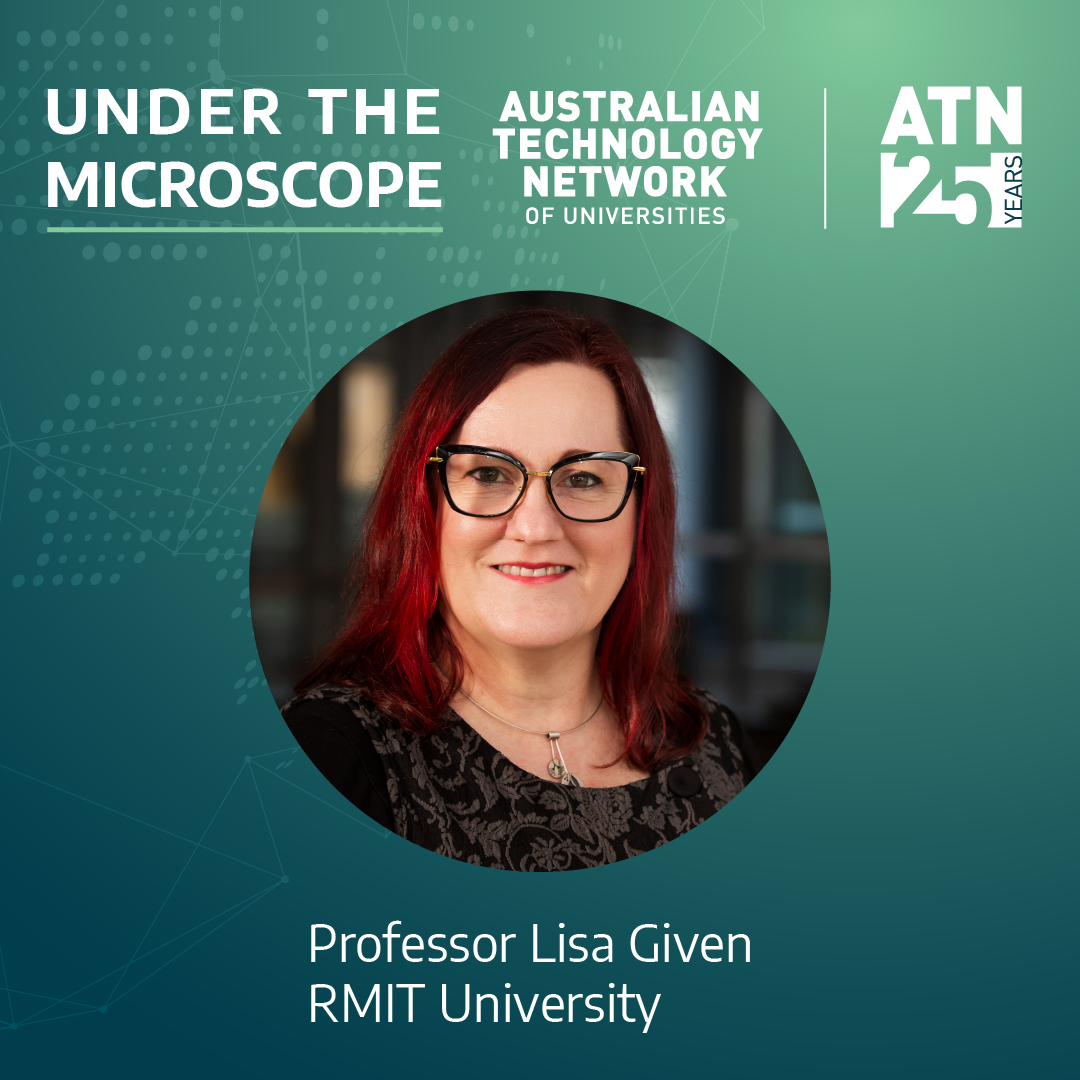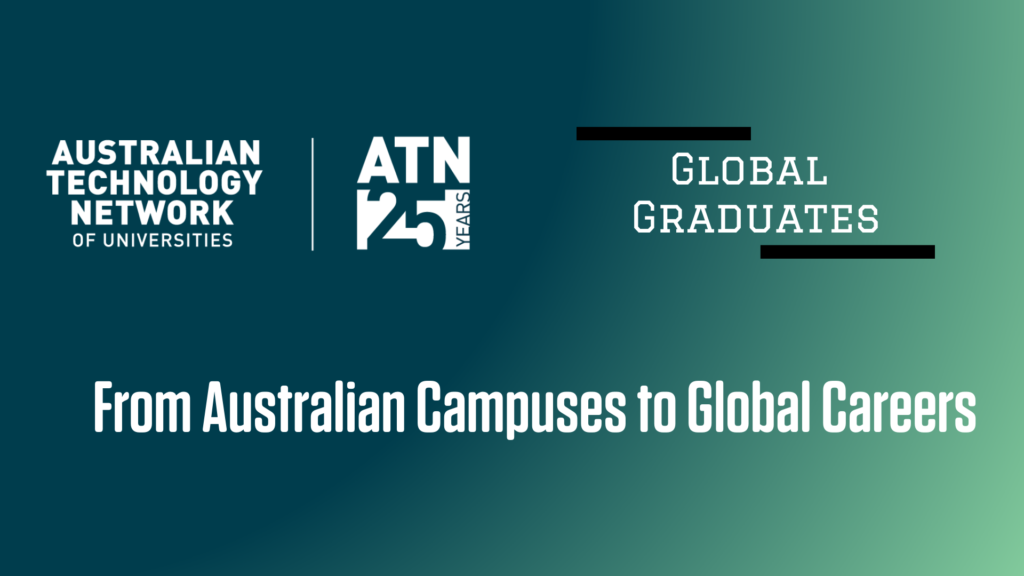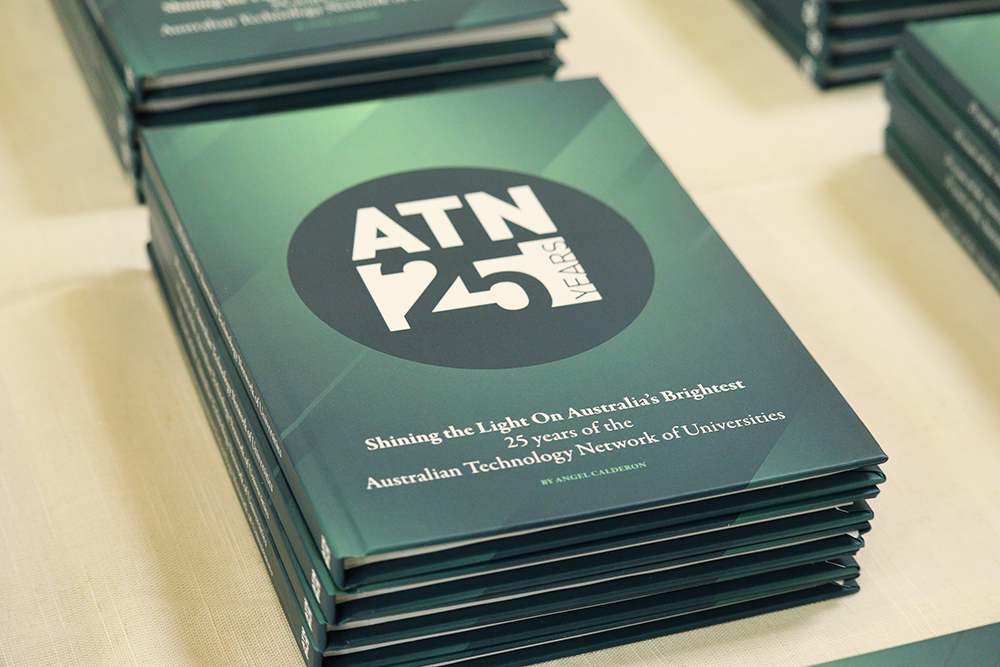ATN Under the Microscope – Professor Lisa Given | RMIT University
ATN interviews Professor Lisa Given from RMIT University – a professor of Information Sciences with a unique blend of technology and popular cultureWhat drove you to your field of research? A bit of serendipity, timing, luck, and opportunity drove me to work in information science. When I finished my undergraduate degrees (in Canada), the government had hiring freezes in place across the public sector and encouraged graduates (especially women) to pursue a Masters degrees. I chose information…

What drove you to your field of research?
A bit of serendipity, timing, luck, and opportunity drove me to work in information science. When I finished my undergraduate degrees (in Canada), the government had hiring freezes in place across the public sector and encouraged graduates (especially women) to pursue a Masters degrees. I chose information science, as it that seemed like a growth area with high employability – and then fell in love with conducting original research. I decided to complete my PhD and the rest is history.
Do you have a surprising or fun fact to share from your research?
In my research, I explore how people and organisations use information and technology tools (such as social media, artificial intelligence tools, smartphone apps, etc.) to guide decision making. I work with colleagues in many different disciplines (e.g., nursing, paediatrics, ecology, wine sciences, education, sociology, philosophy, digital humanities… to name just a few!) and with different industry partners (e.g., hospitals, schools, winemakers, farmers, non-profit organisations, technology companies, and more). Across these various disciplines and contexts, I continue to find that most technology tools are created to meet the designer’s hopes and dreams for what the system will do, but not designed to meet the needs of the people and organisations who use these tools. We need human-centred, needs-focused, and holistic designs to address this problem, in workplaces and homes.
You have a strong interest in the use of AI – do you believe it has a place in university learning?
Absolutely! AI tools have the potential to make our lives easier, by reducing the time it takes to complete mundane tasks (like completing forms) and enabling us to analyse information (such as institutional data) more quickly and efficiently. However, like all technology tools, we need to understand how these tools work, including limitations, ethical issues, and areas for potential harm. As educators and researchers, we need to learn about and adopt these technologies appropriately and to engage with our students and colleagues in learning where and how AI can be responsibly used in our studies and work. We also have a role to play in educating the public about the impact of AI tools, which is why I’m very active in talking to media about this, and in helping individuals and organisations to make wise choices around AI tool use.
You’re a key developer in the upcoming Taylor Swift ‘Swiftposium’ conference. What inspired this unique blend of popular culture and academia?
I’ve organised a public-facing, community event – the RMIT Fanposium – as a complement to the academic Swiftposium conference, in partnership with colleagues at RMIT. When the academic conference was first announced, I reached out to RMIT PhD Candidate Kate Pattison (who sits on the Swiftposium organising committee), to propose that we collaborate on a fun-filled afternoon to celebrate Taylor Swift’s impact on the world. In my role as Director of RMIT’s Social Change Enabling Impact Platform, I work with academics to bring their research to the community and help them to foster positive change from the outcomes of their work. We have a vibrant music industry research group at RMIT (including Dr Shelley Brunt, who is another of our Fanposium organisers), and Taylor Swift’s upcoming Eras Tour seemed like the perfect opportunity to showcase what we do. We were thrilled that more than 500 (free) tickets were snapped up by the community in less than 12 hours.
While the Swiftposium is designed for academics, the Fanposium is designed for Taylor Swift’s fans. We’re featuring the documentary Miss Americana on the big screen at RMIT’s Capitol Theatre, followed by a panel discussion on Taylor Swift’s impact on the music industry. The event will start with a mix of live and pre-recorded fan presentations, featuring fans from around the world! And it wouldn’t be a Taylor Swift event without bracelets, so we’re thrilled that the University of Melbourne Swifties are hosting a friendship bracelet-making event at the start of Fanposium.
How much time do you spend on a university campus? What excites you about working within a university campus?
I spend a lot of time on campus – typically several days a week – to meet with academics and students, and to host community, industry, and government partners. RMIT’s City Campus is located near Melbourne Central Station, which is an ideal location to feel the energy of the city and to welcome people from across Melbourne via trams and trains. I’m very lucky, as my office is steps away from the State Library of Victoria and some amazing restaurants and cafes. The buildings are embedded within the city, so the people and activities on the streets bring a lot of energy to our work.
What do you think is the biggest challenge facing higher education in Australia?
The effects of the COVID19 pandemic have shone a spotlight on the need for stable funding for higher education in Australia, particularly for research. Our reliance on international student recruitment as a revenue stream for higher education, and the increasing indirect costs that we face for research activities, will continue to challenge us in the foreseeable future. A research report by Universities Australia noted a significant drop in Commonwealth investment in research and innovation (from $35.6B in 2019-2020 to only $11.8B in 2021-2022), noting that our spend as a percentage of gross domestic product (1.79 in 2019-2020) is now well below the OECD average (2.68 in 2020). This should concern all Australians, including the millions of people who benefit from our research and innovation activities.
Do you have a hobby?
Yes, I have a few hobbies. My days are very busy, so I like to watch movies and TV series to wind down in the evenings. Anything featuring zombies is a standard go-to show for me! I also like to learn new things, so I’ve taken pottery and silversmithing classes recently. I also love live music, so you’ll often find me in the clubs around Melbourne listening to punk, heavy metal, and alternative music in one of our many fantastic venues.
Can you tell us of a book, film or TV show you recently read or watched that you would recommend and why?
I’m currently reading Eve: How the Female Body Drove 200 Million Years of Evolution (2023) by American academic Cat Bohannon. It’s a fascinating read that brings together evidence and stories from across many disciplines (science, literature, biochemistry, anthropology, film studies, etc.) to explore what makes the female body unique. It took 10 years to complete this book and it’s a very compelling and engaging read that will interest people from all walks of life!
What’s your dream holiday destination and why?
I have several dream holiday destinations, as I love to travel! That’s one of the benefits of being an academic, as conferences and other work opportunities take us to wonderful locations around the globe. My dream holiday destination is a personal one, as I would like to visit Islay in Scotland; that’s where my grandfather was born, so I would like to do a family history tour around the island.
What would you say to a student about to begin their higher education journey in 2024?
My advice would be to enjoy this time and be sure to take some risks. One of the joys of being in higher education is that you are in a supportive environment where you can test out ideas, try something new, and engage with people and topics you might not otherwise encounter in your life. Jump in with both feet!

